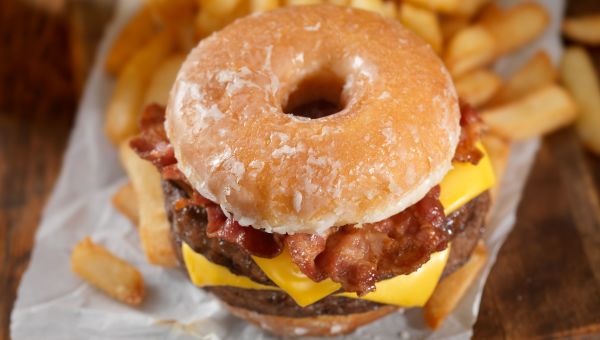6 worst things you can do for your brain
Plus, learn how to reverse unhealthy habits and help boost brain health over the long haul.
Updated on July 14, 2023

The numbers are alarming. According to the Centers for Disease Control and Prevention (CDC), almost 6.7 million people in the United States are living with Alzheimer’s disease (AD) or dementia. By 2060, that total is expected to grow to about 14 million people.
There’s no sure-fire way to prevent dementia, nor can you alter your family history or stop growing older—two of… Show More
The numbers are alarming. According to the Centers for Disease Control and Prevention (CDC), almost 6.7 million people in the United States are living with Alzheimer’s disease (AD) or dementia. By 2060, that total is expected to grow to about 14 million people.
There’s no sure-fire way to prevent dementia, nor can you alter your family history or stop growing older—two of the condition’s biggest risk factors. What you can do is change your lifestyle, and CDC research has shown that your odds of dementia may be significantly influenced by certain habits. In particular, the CDC emphasizes the importance of staying socially connected and taking care of your physical health—such as by avoiding tobacco and managing your cholesterol and blood pressure.
“There’s a lot you can do in terms of lifestyle modifications to improve brain health and decrease dementia risk,” says Elizabeth Morrison-Banks, MD, a neurologist at Riverside Community Hospital in California. Changing long-term patterns can be tough, though, and she acknowledges that patients need to “stay strong and positive” in their approach.
With that in mind, here are the habits linked to higher dementia risk, plus tips on adopting better behaviors for brain health.
Show Less
Smoking
In years past, certain studies—often influenced by the tobacco industry—suggested smoking cigarettes actually protected us from dementia. These days, experts recognize it’s just the opposite.
It’s believed that taking up tobacco raises your risk significantly relative to non-smokers. Smoking is… Show More
In years past, certain studies—often influenced by the tobacco industry—suggested smoking cigarettes actually protected us from dementia. These days, experts recognize it’s just the opposite.
It’s believed that taking up tobacco raises your risk significantly relative to non-smokers. Smoking is strongly linked to both AD and vascular dementia, a form of dementia caused by strokes or other conditions impeding blood flow to the brain.
To a large extent, this is because smoking affects your chances of developing other illnesses associated with dementia, including heart disease, stroke, and diabetes. It does this in part by speeding atherosclerosis, or the hardening of your blood vessels.
Smoking also:
- Increases homocysteine, an amino acid in your blood that’s potentially harmful at high levels
- Boosts inflammation
- Causes oxidative stress, a result of a disruption in your body’s ability to counteract harmful free radicals
What to do: Kicking the habit lowers the risk big-time—to about the same level of people who don’t smoke.
Show Less
Being inactive
If there was ever a reason to move your body, it’s your brain health. Getting little-to-no physical activity (being sedentary) boosts your likelihood of dementia. To an extent, this happens because sedentary people are more prone to obesity, diabetes, and other conditions that contribute to risk.… Show More
If there was ever a reason to move your body, it’s your brain health. Getting little-to-no physical activity (being sedentary) boosts your likelihood of dementia. To an extent, this happens because sedentary people are more prone to obesity, diabetes, and other conditions that contribute to risk. But inactivity also affects the structure of the brain itself. For example, says Dr. Morrison-Banks, it accelerates the narrowing of blood vessels there, which can diminish blood flow and oxygen delivery.
What to do: Research suggests that regular exercise—especially in early- and mid-life—can lower dementia risk. It helps ward off other medical problems, can keep your blood vessels healthier, and may even stimulate beneficial chemical activity in the brain. Exercise can also be a way to broaden your social connections, keeping you from isolation. (More on that later.)
Federal guidelines recommend at least 150 minutes of moderate activity or 75 minutes of vigorous activity weekly, along with two days a week of muscle strengthening activities. Morrison-Banks suggests aerobic—often called cardio—activities like brisk walking. Start with a stroll around your neighborhood, a park, or even a mall. Consistent, long-term fitness is best, but any little bit helps.
Show Less
Becoming socially isolated
When it comes to dementia risk, relationships and personal connections matter. Remarkably, in a 2022 Lancet study, researchers proposed that social connectedness “is a potential universal remedy for cognitive impairment.”
Why? Your cognitive skills may decline quicker when you’re alone, perhaps due… Show More
When it comes to dementia risk, relationships and personal connections matter. Remarkably, in a 2022 Lancet study, researchers proposed that social connectedness “is a potential universal remedy for cognitive impairment.”
Why? Your cognitive skills may decline quicker when you’re alone, perhaps due to less mental stimulation. And, as with other risk factors, isolation raises your chances of developing disorders connected to dementia, like stroke and depression. With no one to motivate you, it’s easy to neglect self-care or medical treatments.
What to do: Whether it’s getting dinner with loved ones or joining a book club, make a point to stay engaged as much as your health allows. It could help build your cognitive reserve, or your brain’s ability to function even when it’s starting to decline. Think of building cognitive reserves like saving money in the bank, says Morrison-Banks, “so that you have a cushion in the event of an unexpected financial shortfall.”
Age-related hearing loss is also linked to dementia risk, in part because it can lead people to become socially withdrawn. If you’re having trouble in this regard, hearing aids may help you plug back in with friends and family.
Show Less
Eating too much sugar or “bad” fats
The science is still emerging, but as it turns out, years of poor eating habits may take a toll on your brain. Thanks to high levels of saturated fat, added sugars, and processed meats, many (though not all) studies have implicated a typical Western diet in a higher risk for dementia.
Eating this… Show More
The science is still emerging, but as it turns out, years of poor eating habits may take a toll on your brain. Thanks to high levels of saturated fat, added sugars, and processed meats, many (though not all) studies have implicated a typical Western diet in a higher risk for dementia.
Eating this way contributes to conditions like obesity, heart disease, and diabetes, and research shows being obese in middle age significantly raises your dementia risk. People with type 2 diabetes are more likely to develop AD as those who don’t have diabetes.
What to do: In general, says Morrison-Banks, “a healthy diet low in saturated fat and featuring whole grains and more plant-based foods can be quite powerful in improving cognitive health.” And while there’s not currently enough evidence that any specific eating plan lowers dementia risk, those such as the Mediterranean-style diet, the MIND diet, and the DASH diet are often recommended by experts as generally beneficial. They can contribute to weight loss, and often lead to improved cardiovascular health, better insulin levels, and less inflammation, all of which work in your brain’s favor.
Show Less
Ignoring your health issues
A plethora of other medical conditions can raise your dementia chances, so it’s important to keep a handle on them—or, if possible, to prevent them from happening in the first place. “If you can control the underlying causes,” says Morrison-Banks, “you have a much better chance of preserving… Show More
A plethora of other medical conditions can raise your dementia chances, so it’s important to keep a handle on them—or, if possible, to prevent them from happening in the first place. “If you can control the underlying causes,” says Morrison-Banks, “you have a much better chance of preserving cognitive function as you get older.” These three have been found to be particularly hazardous:
Hypertension: Having high blood pressure (HBP) in middle age increases your chances for developing dementia as you grow older. The relationship is complicated but has to do with HBP’s effects on blood vessel thickness and elasticity, along with its role in strokes. Managing it, especially during middle and older age, could reduce dementia risk, among many other health benefits.
Depression: Studies suggest a history of depression or developing depression later in life is associated with an increased risk of dementia, as well. That’s why it’s important to be aware of its symptoms, including persistent low mood, loss of interest in activities you enjoy, and significant changes in sleeping or eating habits. If you see signs, speak to a healthcare provider (HCP) so you can be evaluated.
Diabetes: Type 2 diabetes is a noteworthy risk factor for dementia. The best defense is preventing it from occurring at all. See your HCP about appropriate tests and keep up with a healthy diet and consistent physical activity. And if you’ve already been diagnosed, managing and treating type 2 diabetes may help lower your dementia risk.
Show Less
Getting poor sleep
While insomnia, sleep deprivation, oversleeping, sleep-disordered breathing, and other disruptions have all been linked to dementia, more studies are needed to assess whether or not better sleep management could in fact lower your risk. One big issue: Just as impaired sleep might contribute to… Show More
While insomnia, sleep deprivation, oversleeping, sleep-disordered breathing, and other disruptions have all been linked to dementia, more studies are needed to assess whether or not better sleep management could in fact lower your risk. One big issue: Just as impaired sleep might contribute to dementia, dementia also impairs sleep, making it tough to tell which came first. It’s possible it’s a little of both.
More research is emerging every day. “One study found that sleep deprivation increased a protein in the brain called beta-amyloid, which increases risk of dementia,” says Morrison-Banks. The study, published in 2018 in Proceedings of the National Academy of Sciences, took brain scans of 20 adults following about 31 sleepless hours. Their beta-amyloid levels rose about 5 percent, suggesting even a short deprivation could mess with your brain’s ability to clear out those harmful substances.
What to do: There’s emerging evidence that getting enough high quality sleep lowers dementia risk, and in general, it’s a healthy practice. So, shoot for the recommended total each night—seven to nine hours for people between 18 and 64, and seven to eight hours for adults 65 and older. To help you snooze, keep a consistent bedtime/wake-up schedule, try to get some exercise every day, and don’t bring your phones and other electronic devices into your bedroom. If you have sleep-disordered breathing, like sleep apnea, use of a CPAP machine may help. Speak with your HCP for advice.
Show Less
Wait, there's more!
Following these additional suggestions may also lower your dementia risk. At the least, you’ll boost your overall health.
Protect your head. Research shows that moderate or severe traumatic brain injuries (TBIs) raise your chances of dementia, even more so if they’re repeated, as they might be for… Show More
Following these additional suggestions may also lower your dementia risk. At the least, you’ll boost your overall health.
Protect your head. Research shows that moderate or severe traumatic brain injuries (TBIs) raise your chances of dementia, even more so if they’re repeated, as they might be for boxers, football players, or people in the military. Safeguard yourself by always wearing a seatbelt when driving, using appropriate safety gear for sports, wearing a helmet when biking, and reducing tripping hazards around the house.
Find your reason for being. Having a purpose in life has been associated with a lower incidence of dementia. The effects on the body aren’t well-known, but “it helps us focus on wellness activities such as exercise, healthy diet, and socialization,” says Morrison-Banks. “It can be a strong motivator to stay active and healthy.”
Moderate your alcohol intake. People who drink alcohol to excess are at higher risk for dementia. Abstaining or limiting yourself to one drink per day for women and two for men may lower your odds. Avoid binge drinking entirely.
Train your brain. Some research suggests that cognitive training—programs typically designed to improve memory, mental processing speed, reasoning, and problem solving—may help slow the cognitive decline that comes with age. The effectiveness of brain games is unclear, but pursuing intellectual activities can be a relatively easy and fun way to help keep your brain in shape over the years.
Show Less
Centers for Disease Control and Prevention. Alzheimer’s Disease and Related Dementias. Page last reviewed October 26, 2020.
Centers for Disease Control Prevention. Healthy Body, Healthier Brain. Page last reviewed May 29, 2020.
The Guardian. Smoking Prevents Alzheimer’s? Depends Who You Ask. March 5, 2010.
Alzheimer’s Association. Vascular Dementia. Accessed on April 17, 2023.
Johns Hopkins Medicine. Vascular Dementia. Accessed on April 17, 2023.
National Heart, Lung, and Blood Institute. How Smoking Affects the Heart and Blood Vessels. Accessed on April 17, 2023.
MedlinePlus. Homocysteine Test. Accessed on April 17, 2023.
Centers for Disease Control and Prevention. Health Effects of Cigarette Smoking. Page last reviewed October 29, 2021.
Caliri AW, Tommasi S, Besaratinia A. Relationships among smoking, oxidative stress, inflammation, macromolecular damage, and cancer. Mutat Res Rev Mutat Res. 2021 Jan-Jun;787:108365.
Centers for Disease Control and Prevention. Dementia Risk Reduction. Page last reviewed August 23, 2022.
Domingos C, Pego JM, Santos NC. Effects of physical activity on brain function and structure in older adults: A systematic review. Behavioural Brain Research. 2021 March 26;402:113061.
Suragarn U, Hain D, Pfaff G. Approaches to enhance social connection in older adults: An integrative review of the literature. Aging and Health Research. 2021 September; 1(3); 100029.
Centers for Disease Control and Prevention. How Much Physical Activity Do Adults Need? Page last reviewed June 2, 2022.
Roth AR. Social Connectedness and Cognitive Decline. The Lancet. 2022 November;3(11): E723-E724.
Centers for Disease Control and Prevention. Loneliness and Social Isolation Linked to Serious Health Conditions. Page last reviewed April 29, 2021.
Harvard Health Publishing. What is Cognitive Reserve? January 6, 2023.
Griffiths TD, Lad M, Kumar S, et al. How Can Hearing Loss Cause Dementia? Neuron. 2020 Nov 11;108(3):401-412.
National Institute on Aging. What Do We Know About Diet and Prevention of Alzheimer’s Disease? Page last reviewed November 27, 2019.
Slomski A. Obesity Is Now the Top Modifiable Dementia Risk Factor in the US. JAMA. 2022;328(1):10.
Centers for Disease Control and Prevention. The Effects of Diabetes on the Brain. Page last reviewed May 21, 2022.
Zhang X, Tong T, Chang A, et al. Midlife lipid and glucose levels are associated with Alzheimer's disease. Alzheimers Dement. 2023 Jan;19(1):181-193.
National Institute on Aging. High Blood Pressure May Lower or Raise Dementia Risk Among Older Adults Depending on Age. February 10, 2022.
Omura JD, McGuire LC, Patel R, et al. Modifiable Risk Factors for Alzheimer Disease and Related Dementias Among Adults Aged ≥45 Years - United States, 2019. MMWR Morb Mortal Wkly Rep. 2022 May 20;71(20):680-685.
American Psychiatric Association. What is Depression? Page last reviewed October 2020.
Xu W, Tan C, Zou J, et al. Sleep problems and risk of all-cause cognitive decline or dementia: An updated systematic review and meta-analysis. Cognitive Neurology. Neurology, Neurosurgery & Psychiatry. 2020;91:236-244.
Wang C, Holtzman DM. Bidirectional relationship between sleep and Alzheimer’s disease: Role of amyloid, tau, and other factors. Neuropsychopharmacology News. 2020;45:104-120.
Shokri-Kojori E, Wang GJ, Wiers CE, et al. β-Amyloid accumulation in the human brain after one night of sleep deprivation. Proc Natl Acad Sci U S A. 2018 Apr 24;115(17):4483-4488.
Andrew E. Budson. Sleep well—and reduce your risk of dementia and death. Harvard Health Publishing. May 3, 2021.
Centers for Disease Control and Prevention. How Much Sleep Do I Need? Page last reviewed September 14, 2022.
Centers for Disease Control and Prevention. Tips for Better Sleep. Page last reviewed September 13, 2022.
Alzheimer’s Association. Traumatic Brain Injury (TBI). Accessed on April 19, 2023.
Sutin AR, Aschwanden D, Luchetti M, et al. Sense of Purpose in Life Is Associated with Lower Risk of Incident Dementia: A Meta-Analysis. J Alzheimers Dis. 2021;83(1):249-258.
Alzheimer’s Association. Tobacco and Alcohol and the Risk of Cognitive Decline and Dementia: Choices Make a Difference. Accessed on April 19, 2023.
Harvard Health Publishing. Protecting against cognitive decline. January 2, 2021.
More On


video

article

slideshow


video


video
